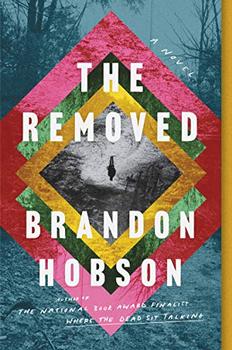Summary | Excerpt | Reviews | Beyond the Book | Readalikes | Genres & Themes | Author Bio

Ernest shivered in his sweater, even though it was still warm. "Time to go inside," he said, getting up from his chair.
"I'll be right in," I told him.
He slid open the screen door and stepped inside. I leaned forward and looked out over the yard. Red and yellow leaves were scattered everywhere on the sloping ground. Evenings were quiet and still. Some mornings I sat on that deck and watched a red-tailed hawk return to its same nesting tree while red-winged blackbirds gathered at the birdhouse. Every now and then several cedar waxwings would land on a branch, apple-blossom petals in their beaks, and sit there watching me.
In the distance, tonight, a fog settled over the lake, and I could sense the presence of something gathering there.
WE LIVED ON A WINDING DIRT ROAD by Lake Tenkiller in a hardwood forest of persimmon, oak, and hickory trees near the Cookson Hills. Many years ago, the Cherokees came to this area during the Trail of Tears to build a nation. They developed a tribal government, constructed buildings and schools, and invented a syllabary. Ernest and I both grew up in Quah. When we were newly married, he built a back deck onto our house, overlooking the slope of trees down to the edge of the water.
It was in this place that we raised our three children. Here, in our house made of rock and brick, with its slanted roof and chimney full of spirits. Here, where we slept under the blue light of the moon in the dark sky, waking sometimes to see a deer at the edge of the yard. I remember seeing a family of deer gather down the hill near the water. And how sad our daughter Sonja was when they never returned, and how Ray-Ray promised they would return one day. Sonja was only a teenager. After Ray-Ray died, she sat watching for a deer all winter, but we never saw them again. "It's deer season," she said. "Maybe they died, too. Maybe someone shot them and dragged their bodies away in their truck." I pictured their bodies hanging somewhere, and all that blood dripping. We sat on the back deck, and I prayed for deer to return and for Sonja to heal. We soon saw other deer along the road, but Sonja was still unhappy. "It's not the same family," she said. "I can tell. This deer is different. The deer that came to our house are dead."
Fifteen years earlier, on September 6, our son Ray-Ray rode his motorcycle to a mall where he evidently got into an altercation with two other guys. Someone fired a gun, and Ray-Ray was shot in the chest by a police officer. The police officer heard a gunshot and instinctively fired at the Indian kid. Afterward, when the police officer gave his statement to the press, he swore he thought Ray-Ray had been the one who shot the gun, but it had been a white kid. The officer was temporarily placed on administrative leave. After months of investigation, the police department declared that the officer's behavior was justified in the shooting, so it never went to trial.
Everything changed in me after that.
How do you lose a child to gun violence and expect to return to a normal way of life? This was the question I struggled with the most. My son was a victim. The officer who shot him—now retired—lived in our town, and there were many sleepless nights when I wanted to drive to his house and kill him myself. I wanted to hit him as hard as I could, so that he could feel pain. Yes, yes, I have always known grief is difficult and that forgiveness takes many years. I still haven't learned to completely forgive. I could only put it in the will of the Great Spirit. Ernest handled it better than me; he was able to get himself together and go back to work at the railroad after a month or so. A doctor prescribed Xanax for me, and then for a long time all I did was sleep. Every day I sat in a chair by the window.
My sister Irene came and stayed with us to help out, especially with Sonja and Edgar. In the midst of my depression, Irene dragged me to a Methodist church service one Sunday, where I heard the Doxology for the first time. After that I kept hearing the phrase in my head: "Praise God from whom all blessings flow," over and over. When I got home, I wrote it down in my notebook. My therapist encouraged me to journal as much as possible. I once wrote, I no longer am afraid of dying. If I die in my sleep, I am fine with that. Another time I wrote, I feel so guilty for wanting to die when I have Sonja and Edgar who so desperately need me. I feel like a terrible person. But the Doxology kept returning to me. Thinking about it was so comforting, I found my journaling didn't return to such a dark place.
Excerpted from The Removed by Brandon Hobson. Copyright © 2021 by Brandon Hobson. Excerpted by permission of Ecco. All rights reserved. No part of this excerpt may be reproduced or reprinted without permission in writing from the publisher.
Your guide toexceptional books
BookBrowse seeks out and recommends the best in contemporary fiction and nonfiction—books that not only engage and entertain but also deepen our understanding of ourselves and the world around us.